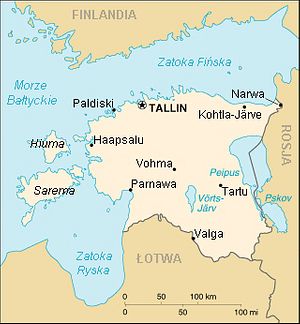According to Estonian state news and the country’s president, an Estonian counterintelligence official was “kidnapped to Russia from Estonia” at gunpoint. The kidnapped official is a member of Estonia’s International Security Service (ISS), the Estonian government agency responsible for counterintelligence, corruption investigations, and anti-organized crime activities. So far, it is unknown if the official was captured by Russian state agents directly or by a non-government party, but Estonian officials highly suspect the former. The incident comes at a time of high tensions between Russia and the West, particularly the European Union and NATO. Estonia is a member of both institutions. U.S. President Barack Obama pledged NATO’s support for the Baltic states in Estonia just two days prior to this incident.
Estonian state news provided the following account of the incident: “The incident occurred at about 9:00 on the Estonian side of the border and was preceded by jamming of communications and use of a smoke grenade, the ISS said; the interference was said to originate from the Russia side.” Following the abduction, Russia’s FSB, the country’s security agency, “was first to mention the name of the agent, Eston Kohver, which was later confirmed by the ISS.” This suggests, if not direct involvement by Russian security forces, some complicity. At a later meeting between Estonian and Russian border guards, the latter apparently claimed to have no reports of the incident. Additionally, the director general of the ISS said that there were signs of a “violent struggle.”
In a statement, Estonia’s foreign minister notes: “This is a very galling incident. We expect full assistance and cooperation from Russia in resolving the incident and bringing the Estonian citizen back to Estonia.” Estonia has summoned the Russian ambassador to the country to explain the incident. Estonian Prime Minister Taavi Rõivas issued a statement saying that Estonia expected “Russia’s full cooperation,” and that his country’s primary task was to “free the officer.”
Following the collapse of the Soviet Union, relations between Estonia and Russia have been marred by suspicion and mistrust, particularly since Vladimir Putin came to power in Russia. With Estonia’s accession to both NATO and the European Union in 2004, the country firmly aligned itself with the West and rejected Russian influence. This came after Estonia denied Russian security guarantees in the late 1990s in exchange for abstaining from joining NATO. In 2005, Russian government officials maintained that the Soviet Union’s annexation of the Baltic states, including Latvia, Lithuania, and Estonia, was legitimate. In 2007, a series of cyberattacks originating from Russia temporarily crippled critical civilian organizations in Estonia, including government agencies, banks, and broadcasters. Fears remain high among the Baltic states that Russia could attempt to annex territory to protect ethnic Russians and Russian language speakers, particularly after Vladimir Putin used that justification for his annexation of Crimea and current involvement in Eastern Ukraine. This incident will do little to abate those concerns.
At the time of this writing, officials from neither the European Union nor NATO have reacted to the incident. Given heightened tensions between NATO and Russia over the crisis in Ukraine, the incident could draw strong condemnation from these parties.

































